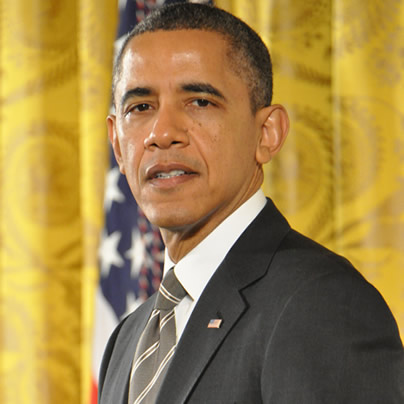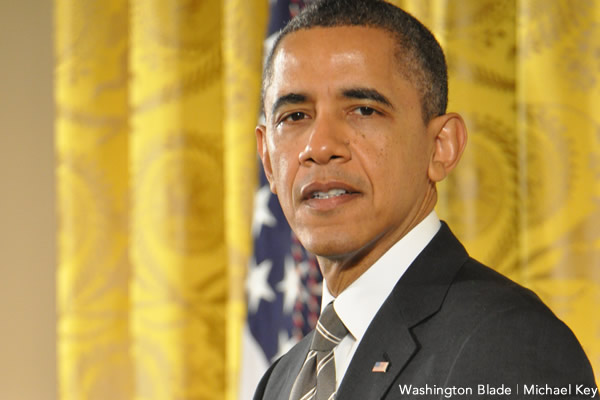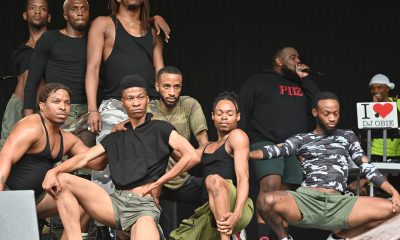National
New calls for ENDA directive as White House reception approaches
Will Obama be heckled by attendees seeking workplace protections?


President Obama is facing renewed calls for an ENDA executive order. (Washington Blade file photo by Michael Key)
The absence of federal LGBT workplace non-discrimination protections continues to rile advocates as the White House prepares to welcome members of the LGBT community for a Pride reception.
LGBT advocates told the Washington Blade days before the event they had a singular desire for what they want President Obama to say to attendees — that he’ll sign an executive order barring federal contractors from discriminating against LGBT workers.
Fred Sainz, vice president of communications for the Human Rights Campaign, recalled Obama’s words during the 2008 presidential campaign as he called on him to announce he’ll sign the executive order.
“It’s been five long years since he made a promise to sign it and it’s long past time it gets done,” Sainz said. “This president has done virtually everything right on issues of LGBT equality. He’s been a steadfast ally. That’s why it’s so frustrating to see time go by without his signature on an EO that would protect millions of LGBT workers nationwide.”
The executive order is considered a campaign promise based on a “yes” response that then-candidate Obama gave on a questionnaire to the Houston GLBT Political Caucus indicating he supports a non-discrimination policy for all federal contractors based on sexual orientation and gender identity.
The Pride reception comes as the LGBT workplace non-discrimination issue has gained prominence — even in mainstream media. Last week, Ellen Sturtz, a lesbian activist affiliated with GetEQUAL, made headlines when she confronted first lady Michelle Obama at a Democratic National Committee fundraiser in D.C. and heckled her about the executive order.
Given the media interest in the confrontation last week, it’s possible advocates would pursue the same strategy — this time at an event where the president is slated to appear and one geared specifically for the LGBT community.
Heather Cronk, managing director of GetEQUAL, said her organization is planning “an action” for this week when asked whether her organization is doing something for the Pride reception. She declined to elaborate.
Shin Inouye, a White House spokesperson, offered few details via email when asked what Obama intends to say at the Pride reception.
“On Thursday, the President will deliver remarks at the LGBT Pride Month celebration at the White House,” Inouye said.
Tico Almeida, president of Freedom to Work, took the liberty of crafting a speech for Obama.
“When I first campaigned for president, I promised – in writing – to take executive action preventing federal contractors like ExxonMobil from wasting taxpayer money by discriminating against LGBT Americans,” Almeida said he hoped Obama would say. “For five years you’ve waited for me to do what’s right – sometimes patiently and sometimes not. … I’m sorry we’ve moved too slowly on this promise, but the good news is I brought a pen with me today.”
As pressure mounts on Obama to sign the executive order, members of the LGBT community from across the country are slated to make an appearance at the Pride reception on Thursday.
In a statement on June 3, Daryl Justin Finizio, mayor of New London, Conn., announced on his Facebook page he was set to attend the reception along with his spouse, Todd Ledbetter.
“My partner and I are moved by this invitation and are very grateful to President Obama for doing so much to support equal rights for all Americans,” Finizio said. “We’re proud to attend and represent our progressive city and its broad and diverse community of people from different nationalities, religions and genders.”
Also slated to attend the reception is the first gay couple legally married in Michigan, according to MLive.com. Gene Barfield and his spouse, Tim LaCroix, were married in March in the Little Traverse Bay Bands of Odawa Indians reservation after being together 30 years. Their marriage isn’t recognized by the state itself, which has a constitutional amendment banning same-sex marriage.
Barfield, who marched on the White House and returned his service medals from his time in the U.S. Navy in protest of “Don’t Ask Don’t Tell,” reportedly said he was shocked to receive the invitation.
“We’re always going to be in shock about this,” Barfield said. “The fact that there is going to be an LGBT celebration at the White House, times change, times change.”
According to Los Angeles Times, also planning to attend the reception is Rev. R. Guy Erwin, who was recently elected the Evangelical Lutheran Church in America’s first openly gay bishop. Bishop-elect Erwin was elected last month to a six-year term in the church’s Southwest California Synod, which includes the greater Los Angeles area.
Rea Carey, executive director of the National Gay & Lesbian Task Force said she wants the president to announce at the reception he’ll issue a directive to protect LGBT employees.
“We want to see him honor Pride month by ending the daily fear experienced by millions of Americans of losing their livelihoods because of who they are or who they love,” Carey said.
National
Same-sex couples vulnerable to adverse effects of climate change
Williams Institute report based on Census, federal agencies

A new report by the Williams Institute at the UCLA School of Law finds that same-sex couples are at greater risk of experiencing the adverse effects of climate change compared to different-sex couples.
LGBTQ people in same-sex couple households disproportionately live in coastal areas and cities and areas with poorer infrastructure and less access to resources, making them more vulnerable to climate hazards.
Using U.S. Census data and climate risk assessment data from NASA and the Federal Emergency Management Agency, researchers conducted a geographic analysis to assess the climate risk impacting same-sex couples. NASA’s risk assessment focuses on changes to meteorological patterns, infrastructure and built environment, and the presence of at-risk populations. FEMA’s assessment focuses on changes in the occurrence of severe weather events, accounting for at-risk populations, the availability of services, and access to resources.
Results show counties with a higher proportion of same-sex couples are, on average, at increased risk from environmental, infrastructure, and social vulnerabilities due to climate change.
“Given the disparate impact of climate change on LGBTQ populations, climate change policies, including disaster preparedness, response, and recovery plans, must address the specific needs and vulnerabilities facing LGBTQ people,” said study co-author Ari Shaw, senior fellow and director of international programs at the Williams Institute. “Policies should focus on mitigating discriminatory housing and urban development practices, making shelters safe spaces for LGBT people, and ensuring that relief aid reaches displaced LGBTQ individuals and families.”
“Factors underlying the geographic vulnerability are crucial to understanding why same-sex couples are threatened by climate change and whether the findings in our study apply to the broader LGBTQ population,” said study co-author Lindsay Mahowald, research data analyst at the Williams Institute. “More research is needed to examine how disparities in housing, employment, and health care among LGBT people compound the geographic vulnerabilities to climate change.”
Read the report
Federal Government
Lambda Legal praises Biden-Harris administration’s finalized Title IX regulations
New rules to take effect Aug. 1

The Biden-Harris administration’s revised Title IX policy “protects LGBTQ+ students from discrimination and other abuse,” Lambda Legal said in a statement praising the U.S. Department of Education’s issuance of the final rule on Friday.
Slated to take effect on Aug. 1, the new regulations constitute an expansion of the 1972 Title IX civil rights law, which prohibits sex-based discrimination in education programs that receive federal funding.
Pursuant to the U.S. Supreme Court’s ruling in the landmark 2020 Bostock v. Clayton County case, the department’s revised policy clarifies that discrimination on the basis of sexual orientation and gender identity constitutes sex-based discrimination as defined under the law.
“These regulations make it crystal clear that everyone can access schools that are safe, welcoming and that respect their rights,” Education Secretary Miguel Cardona said during a call with reporters on Thursday.
While the new rule does not provide guidance on whether schools must allow transgender students to play on sports teams corresponding with their gender identity to comply with Title IX, the question is addressed in a separate rule proposed by the agency in April.
The administration’s new policy also reverses some Trump-era Title IX rules governing how schools must respond to reports of sexual harassment and sexual assault, which were widely seen as imbalanced in favor of the accused.
Jennifer Klein, the director of the White House Gender Policy Council, said during Thursday’s call that the department sought to strike a balance with respect to these issues, “reaffirming our longstanding commitment to fundamental fairness.”
“We applaud the Biden administration’s action to rescind the legally unsound, cruel, and dangerous sexual harassment and assault rule of the previous administration,” Lambda Legal Nonbinary and Transgender Rights Project Director Sasha Buchert said in the group’s statement on Friday.
“Today’s rule instead appropriately underscores that Title IX’s civil rights protections clearly cover LGBTQ+ students, as well as survivors and pregnant and parenting students across race and gender identity,” she said. “Schools must be places where students can learn and thrive free of harassment, discrimination, and other abuse.”
Michigan
Mich. Democrats spar over LGBTQ-inclusive hate crimes law
Lawmakers disagree on just what kind of statute to pass

Michigan could soon become the latest state to pass an LGBTQ-inclusive hate crime law, but the state’s Democratic lawmakers disagree on just what kind of law they should pass.
Currently, Michigan’s Ethnic Intimidation Act only offers limited protections to victims of crime motivated by their “race, color, religion, gender, or national origin.” Bills proposed by Democratic lawmakers expand the list to include “actual or perceived race, color, religion, gender, sexual orientation, gender identity or expression, ethnicity, physical or mental disability, age, national origin, or association or affiliation with any such individuals.”
Democratic Gov. Gretchen Whitmer and Attorney General Dana Nessel have both advocated for a hate crime law, but house and senate Democrats have each passed different hate crimes packages, and Nessel has blasted both as being too weak.
Under the house proposal that passed last year (House Bill 4474), a first offense would be punishable with a $2,000 fine, up to two years in prison, or both. Penalties double for a second offense, and if a gun or other dangerous weapons is involved, the maximum penalty is six years in prison and a fine of $7,500.
But that proposal stalled when it reached the senate, after far-right news outlets and Fox News reported misinformation that the bill only protected LGBTQ people and would make misgendering a trans person a crime. State Rep. Noah Arbit, the bill’s sponsor, was also made the subject of a recall effort, which ultimately failed.
Arbit submitted a new version of the bill (House Bill 5288) that added sections clarifying that misgendering a person, “intentionally or unintentionally” is not a hate crime, although the latest version (House Bill 5400) of the bill omits this language.
That bill has since stalled in a house committee, in part because the Democrats lost their house majority last November, when two Democratic representatives resigned after being elected mayors. The Democrats regained their house majority last night by winning two special elections.
Meanwhile, the senate passed a different package of hate crime bills sponsored by state Sen. Sylvia Santana (Senate Bill 600) in March that includes much lighter sentences, as well as a clause ensuring that misgendering a person is not a hate crime.
Under the senate bill, if the first offense is only a threat, it would be a misdemeanor punishable by one year in prison and up to $1,000 fine. A subsequent offense or first violent hate crime, including stalking, would be a felony that attracts double the punishment.
Multiple calls and emails from the Washington Blade to both Arbit and Santana requesting comment on the bills for this story went unanswered.
The attorney general’s office sent a statement to the Blade supporting stronger hate crime legislation.
“As a career prosecutor, [Nessel] has seen firsthand how the state’s weak Ethnic Intimidation Act (not updated since the late 1980’s) does not allow for meaningful law enforcement and court intervention before threats become violent and deadly, nor does it consider significant bases for bias. It is our hope that the legislature will pass robust, much-needed updates to this statute,” the statement says.
But Nessel, who has herself been the victim of racially motivated threats, has also blasted all of the bills presented by Democrats as not going far enough.
“Two years is nothing … Why not just give them a parking ticket?” Nessel told Bridge Michigan.
Nessel blames a bizarre alliance far-right and far-left forces that have doomed tougher laws.
“You have this confluence of forces on the far right … this insistence that the First Amendment protects this language, or that the Second Amendment protects the ability to possess firearms under almost any and all circumstances,” Nessel said. “But then you also have the far left that argues basically no one should go to jail or prison for any offense ever.”
The legislature did manage to pass an “institutional desecration” law last year that penalizes hate-motivated vandalism to churches, schools, museums, and community centers, and is LGBTQ-inclusive.
According to data from the U.S. Department of Justice, reported hate crime incidents have been skyrocketing, with attacks motivated by sexual orientation surging by 70 percent from 2020 to 2022, the last year for which data is available.
Twenty-two states, D.C., Puerto Rico, and the U.S. Virgin Islands have passed LGBTQ-inclusive hate crime laws. Another 11 states have hate crime laws that include protections for “sexual orientation” but not “gender identity.”
Michigan Democrats have advanced several key LGBTQ rights priorities since they took unified control of the legislature in 2023. A long-stalled comprehensive anti-discrimination law was passed last year, as did a conversion therapy ban. Last month the legislature updated family law to make surrogacy easier for all couples, including same-sex couples.
A bill to ban the “gay panic” defense has passed the state house and was due for a Senate committee hearing on Wednesday.
-

 District of Columbia5 days ago
District of Columbia5 days agoNew D.C. LGBTQ+ bar Crush set to open April 19
-

 District of Columbia5 days ago
District of Columbia5 days agoReenactment of first gay rights picket at White House draws interest of tourists
-

 South America3 days ago
South America3 days agoDaniel Zamudio murderer’s parole request denied
-

 Opinions5 days ago
Opinions5 days agoOpen or closed? No, not your bar tab












